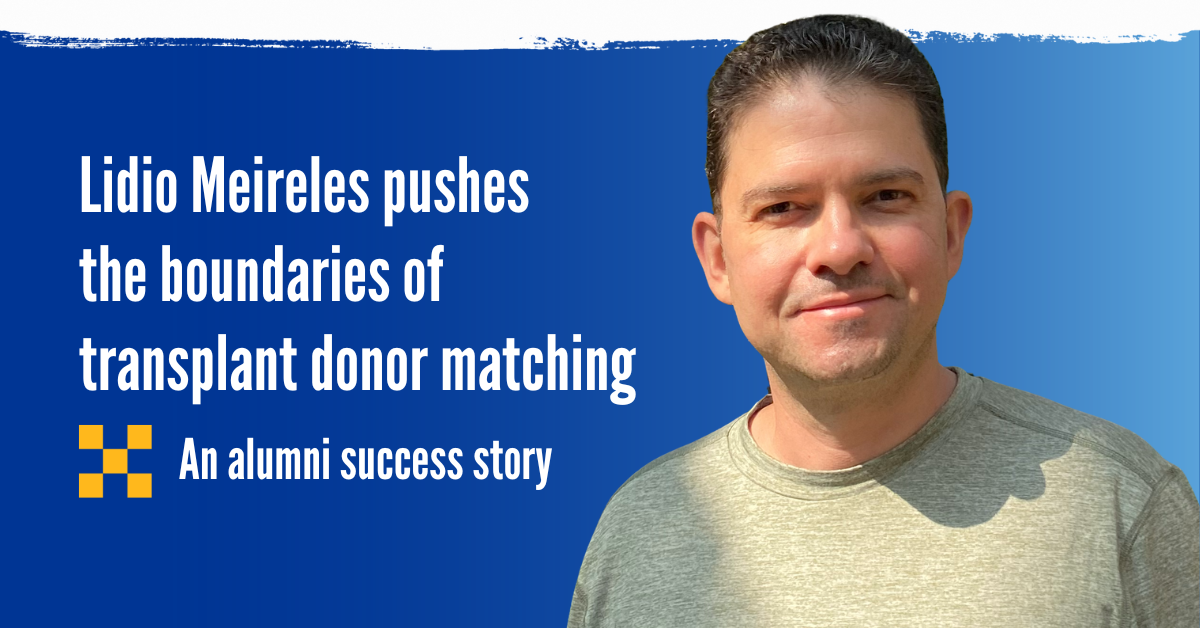Lidio Meireles is leveraging the power of machine learning to find suitable donors for patients seeking stem cell transplants.
The 2011 graduate of the Joint Carnegie Mellon-University of Pittsburgh PhD Program in Computational Biology (CPCB) is now the founder and CEO of Immunomatics LLC. This San Diego-based company focuses on advancing immunobiology with big data analytics.
Meireles didn’t start his career in immunobiology. After earning his PhD, he spent eight years as a research scientist at Vertex Pharmaceuticals, most notably contributing to the discovery of Journavx (suzetrigine). Journavx is a newly FDA-approved non-opioid pain medication. Then, aiming to advance his machine learning expertise, Meireles transitioned into a data science role at FICO, where he developed machine learning algorithms to detect money laundering in financial transactions.
After gaining valuable experience in both pharmaceuticals and machine learning, Meireles was determined to apply his skillset to health care.
“What problem could I solve using machine learning in health care?” Meireles asked himself as he considered his next career move. But it wasn’t until his personal health crisis that the answer became clear.
In 2020, Meireles was diagnosed with an aggressive form of lymphoma. He underwent intensive chemotherapy and a stem cell transplant using his own cells. After a relapse, he needed a second transplant from a donor but struggled to find a perfect match. He eventually found out that his cousin was a mismatched yet acceptable donor. Following a successful second transplant, Meireles has been in remission since 2023.
His struggle to find a suitable donor inspired him to explore how machine learning could improve donor selection. He started his own company to address this problem.
“I always wanted to start a business, but I was afraid of losing the stability that a good job provides,” he said. “But going through that experience was a key turning point. Life is short, and you never know what’s going to happen. Now, I’m taking more risks and pursuing what I truly want to do.”
Meireles launched Immunomatics in April 2024 and is working on creating a proof of concept that he can share with hospitals and investors. He aims to increase transplant opportunities for patients lacking a fully matched donor by leveraging machine learning to identify low-risk, mismatched donors.
As a transplant patient and a scientist with relevant expertise, Meireles is uniquely positioned to revolutionize donor selection and save patient lives.
“Using my knowledge of machine learning and computational biology to design something that makes a meaningful impact in the world is very exciting,” he said.
How did the CPCB program prepare you for your career?
“The multidisciplinary nature of the program was instrumental. Coming from a computer science background, the laboratory methods course helped me understand how biological data is generated and interpreted. That was very helpful later when I joined a pharmaceutical company.”
What skill do you think is important for a young scientist to have?
“Soft skills like effective communication and leadership complement technical skills and are extremely important for career success.”
What advice would you give to prospective CPCB students?
“Think about how your current work aligns with your long-term goals. The clarity will help you choose the right opportunities and prepare for the future.”


